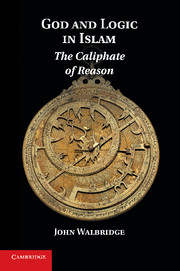Book contents
- Frontmatter
- Contents
- Illustrations
- Preface and Acknowledgements
- Spelling, Names, and Sources
- Introduction
- PART ONE THE FORMATION OF THE ISLAMIC TRADITION OF REASON
- 1 The Problem of Reason in Islam: Is Islam a Non-Rational Religion and Civilization?
- 2 The Diversity of Reason
- 3 Empirical Knowledge of the Mind of God
- 4 The Failure of the Fārābian Synthesis of Religion and Philosophy
- 5 Mysticism, Postclassical Islamic Philosophy, and the Rise and Fall of Islamic Science
- PART TWO LOGIC, EDUCATION, AND DOUBT
- PART THREE THE FALL AND THE FUTURE OF ISLAMIC RATIONALISM
- Selected Bibliography
- Index
4 - The Failure of the Fārābian Synthesis of Religion and Philosophy
Published online by Cambridge University Press: 01 March 2011
- Frontmatter
- Contents
- Illustrations
- Preface and Acknowledgements
- Spelling, Names, and Sources
- Introduction
- PART ONE THE FORMATION OF THE ISLAMIC TRADITION OF REASON
- 1 The Problem of Reason in Islam: Is Islam a Non-Rational Religion and Civilization?
- 2 The Diversity of Reason
- 3 Empirical Knowledge of the Mind of God
- 4 The Failure of the Fārābian Synthesis of Religion and Philosophy
- 5 Mysticism, Postclassical Islamic Philosophy, and the Rise and Fall of Islamic Science
- PART TWO LOGIC, EDUCATION, AND DOUBT
- PART THREE THE FALL AND THE FUTURE OF ISLAMIC RATIONALISM
- Selected Bibliography
- Index
Summary
There is a famous story that one night the philosopher Aristotle appeared to the Caliph Ma'mūn in a dream telling him to seek what was good according to reason. This dream, we are told, was one of the reasons that the caliph initiated a project to translate Greek scientific literature into Arabic. The caliph then wrote to the Byzantine emperor asking for manuscripts to translate. Although at first reluctant, the emperor eventually complied, and a delegation was dispatched from Baghdad to acquire the manuscripts. Perhaps the books were not easily found, for we are told that the Byzantine Christians had suppressed the study of the ancient philosophy in its full form and that one of the ambassadors had to press the emperor for permission to break into a temple library that had been locked since the conversion of Constantine. After that, as the Fihrist states, “[B]ooks on philosophy and other ancient sciences became plentiful in this country.”
There are very good reasons to doubt aspects of this story, but it is certainly true that in the eighth and ninth centuries, Muslim officials and scholars made a concerted effort to commission Arabic translations of the major works of foreign science and philosophy, especially Greek science and philosophy. There were also translations from Middle Persian, mainly works on astronomy, astrology, and practical and political wisdom, some of them originally written in Sanskrit.
- Type
- Chapter
- Information
- God and Logic in IslamThe Caliphate of Reason, pp. 55 - 85Publisher: Cambridge University PressPrint publication year: 2010

